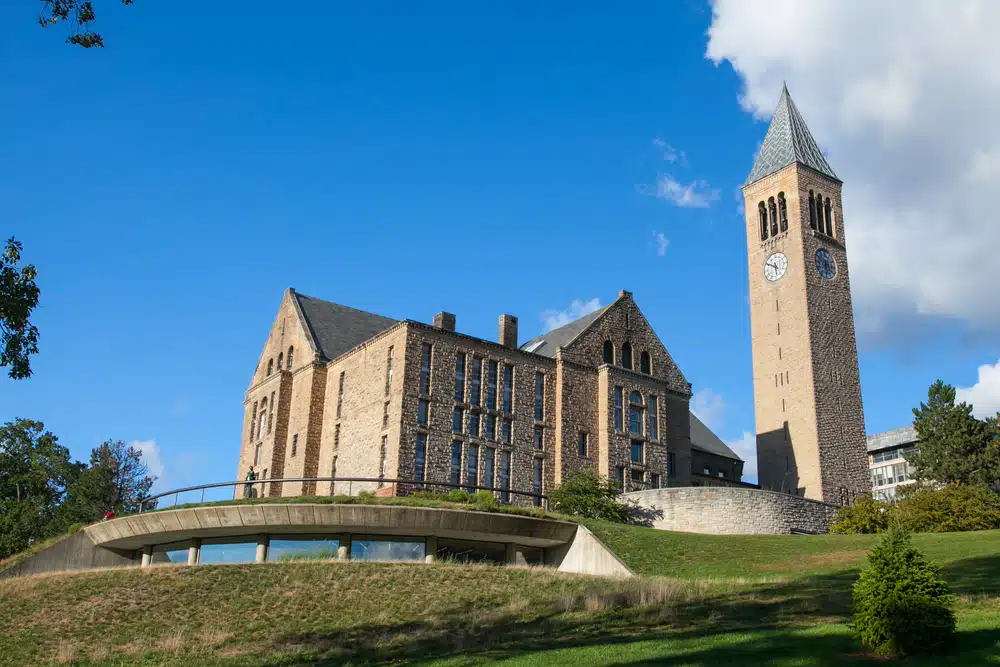Cornell University is ranked 11th nationally, and a big part of its reputation lies in its rigorous academic programs. So, you’re probably wondering, what major is Cornell known for?
In this article, we’ll list down five majors that Cornell is well-known for and discuss what makes them notable. If these are your dream programs, then maybe you can also consider why Cornell might be good for you.
- Engineering at Cornell
- Agricultural Sciences at Cornell
- Biological Sciences at Cornell
- Hotel Administration at Cornell
- Architecture at Cornell
- Frequently Asked Questions
- Takeaways
Engineering at Cornell
Cornell is probably most known for its engineering majors. In fact, its College of Engineering is the highest-ranked engineering school in the Ivy League. Outside the eight prestigious institutions, it’s also the 12th best nationally and the 24th best internationally. This reputation is thanks to factors like rigorous academic programs and a commitment to technological innovation.
Academic programs and research
Cornell has diverse and specialized disciplines across several departments, catering to different interests and career aspirations. Some of the engineering majors that Cornell is especially known for are:
- Computer science. Cornell’s computer science program is highly regarded for its cutting-edge research and contributions to advancements in artificial intelligence, machine learning, and cybersecurity.
- Chemical engineering. The program focuses on the application of chemical principles to solve real-world problems in areas such as energy, materials, and biotechnology. You’ll learn how to produce chemicals or build, design, and run a chemical production plant.
- Civil engineering. Cornell’s civil engineering program emphasizes the design, construction, and maintenance of sustainable infrastructure. One of its major areas of research is geotechnical engineering, which is useful in earthquake simulations.
- Electrical and computer engineering. This program explores the fundamentals of electrical systems, electronics, and computer hardware and software. Its research focuses on areas like data mining, rapid prototyping, and scientific computing.
- Mechanical engineering. Cornell’s mechanical engineering program covers a broad range of topics, including mechanics, thermodynamics, and design. Students and faculty research about biomechanics, energy and sustainability, and advanced manufacturing and materials.
Centers and facilities
Cornell isn’t just known for engineering as a major, but also as a hub of innovation, and this is thanks to the many state-of-the-art centers and facilities that support the conducting of research. The school’s emphasis on interdisciplinary collaboration further promotes the development of innovative solutions to complex challenges.
Here are examples of specific research units that the engineering community would find especially helpful in their pursuits:
- Atkinson Center for a Sustainable Future. This center is also concerned with accelerating energy transitions, which departments like civil and environmental engineering can be heavily involved with.
- Center for Data Science for Enterprise and Society. This center is concerned with data science and its corresponding issues of privacy, security, and fairness.
- Cornell NanoScale Science and Technology Facility (CNF). This facility essentially provides easy access to nanotechnology infrastructure and expertise, helping speed up nanoscale advancements in science, engineering and technology.
Agricultural and Life Sciences at Cornell
Cornell is also known for its agricultural sciences majors, with its College of Agriculture and Life Sciences (CALS) being a globally recognized leader in the field. In fact, it ranks 5th globally among schools for studying agriculture and forestry.
Academic programs and resources
CALS offers a wide range of academic programs that cover different aspects of agricultural and life sciences. Some of the majors Cornell CALS is known for are:
- Agricultural sciences. This gives you a broad interdisciplinary foundation in agriculture. You’ll also choose one concentration you’ll dive deeper into. These possible concentrations include organic agriculture and sustainable cropping systems management.
- Applied economics and management. In this program, you’ll learn about the intersection of agriculture and business. This is an interdisciplinary program that’s also under the Dyson School of Applied Economics and Management, giving you a chance to specialize in agribusiness management, environmental, energy and resource economics, and food industry management.
- Nutritional sciences. This major focuses on areas like the global food crisis, public policy, and the science behind food sources.
- Plant sciences. In this program, you’ll learn the biology, growth, and development of plants, and how you can use them for food, environmental remediation, and improving human health.
CALS also has many facilities and centers that support its research and educational activities in areas like sustainable agriculture, food security, climate change, and biotechnology.
For instance, the New York State Agricultural Experiment Station (NYSAES) in Geneva, New York is a station that focuses on fruit and vegetable production research. Meanwhile, the Musgrave Research Farm provides land for applied agricultural research, teaching, and extension.
Land-grant mission
Aside from simply being known for its agricultural sciences major, Cornell CALS is also known for being part of a land-grant university, giving it a strong commitment to serving the public through outreach and extension programs.
The school also actively disseminates its research findings to stakeholders through publications, conferences, workshops, and online platforms. This ensures that the latest advancements in agricultural and life sciences are accessible to those who can benefit from them the most.
A major part of CALS outreach is promoting sustainable agricultural practices and ensuring food security. For instance, in their Capital Area Agriculture and Horticulture Program, they aim to educate locals through workshops, newsletters, and consultations.
Biological Sciences at Cornell
Cornell is also known for its biological sciences major. In fact, it ranks 14th globally in the subject. The university offers programs in biological sciences at both the College of Arts & Sciences and the College of Agriculture and Life Sciences.
Academic programs
As a biological sciences major, you’ll choose a concentration from areas like biochemistry, genomics and development, systematics and biotic diversity, and more.
However, you’ll also have a good foundation in chemistry, physics, mathematics, and statistics. This is because Cornell emphasizes an interdisciplinary approach, recognizing the interconnectedness of different areas of biology and the importance of collaboration with other disciplines. This approach helps you face complex challenges in biology and related fields.
Within the biological sciences, you can also go on the pre-med track if you wish to be a future doctor.
Research and facilities
Cornell’s research in the biological sciences includes the following areas:
- Biotechnology and genetic engineering
- Cancer biology
- Climate change impacts on ecosystems
- Infectious diseases
- Plant and animal development
- Sustainability and environmental science
These have led to significant advancements in our understanding of life and have contributed to the development of new technologies and therapies. This research is also made possible thanks to specialized facilities and centers, such as:
- Boyce Thompson Institute. An independent research institute located on Cornell’s campus, focusing on plant research.
- The Weill Institute for Cell and Molecular Biology. Supports research related to the fundamental processes of life.
- The Cornell Center for Materials Research (CCMR). Supports interdisciplinary research in materials science, including biomaterials.
- The Laboratory of Ornithology. A world-renowned center for the study of birds.
Hotel Administration at Cornell
Cornell is also known for its hotel administration major. The School of Hotel Administration (SHA) is part of the SC Johnson College of Business and ranks 15th globally for hospitality and leisure management. In 2024, SHA was even ranked #1 by the CEOWORLD Magazine in its “Best Hospitality and Hotel Management Schools in the World for 2024.”
World-class program and research
SHA offers undergraduate and graduate programs in hospitality management, focusing on all aspects of the industry—including hotel operations, food and beverage management, real estate, finance, marketing, and strategy. Their curriculum aims to improve your critical thinking, problem-solving, and communication skills to help you succeed in the dynamic hospitality industry.
Cornell also has the Center for Hospitality Research, where research is conducted to inform industry practices and contribute to the advancement of knowledge in the field. Examples of research topics include:
- Consumer behavior
- Revenue management
- Sustainability
- Technology innovation in the hospitality sector
Facilities and resources
Cornell’s hotel administration major is well-known also thanks to the facilities and resources that you can take advantage of.
Perhaps the most notable is the Statler Hotel on campus, which is a unique teaching hotel managed by seasoned professionals and SHA students. This lets you apply your classroom knowledge to hands-on experiences in the real world. You’ll be working alongside professionals who will help you improve your skills across the different hotel and restaurant operations.
It’s also worth noting that the Statler Hotel is a full-service luxury hotel that houses the J. Willard Marriott Executive Education Center, three restaurants, and at least 14,000 square feet of facilities for meetings and banquets.
Other notable facilities associated with SHA are:
- Institute for Food and Beverage Management. A dedicated space for students to learn about and experiment with different beverages.
- Marriott Student Learning Center. Contains a comprehensive collection of resources related to the hospitality industry.
- Kitchen laboratories. Professional-grade kitchens where students gain practical experience in food preparation and management.
SHA also has strong ties to the hospitality industry, with extensive partnerships with leading hotels, restaurants, and other organizations. This gives you valuable internship and job opportunities.
Architecture at Cornell
Cornell is also known for its architecture major, which ranks 19th worldwide. The undergraduate program is accredited by NAAB.
Interdisciplinary programs
Cornell’s well-known architecture major is found in the College of Architecture, Art, and Planning (AAP). The program wants you to have a strong theoretical and historical grounding with good practical design skills. This balance of artistic expression and technical proficiency will push you to develop critical thinking and innovative problem-solving abilities.
Cornell’s Bachelor of Architecture program is a five-year professional degree program that provides a comprehensive architectural education where you’ll learn design, theory, history, technology, and representation.
As an architecture major, you’ll also be expected to take classes at other colleges at Cornell and in other departments within AAP. On top of that, you’ll be asked to choose an architecture concentration from these options:
- Architecture, culture, and society
- Architectural science and technology
- History of architecture
- Architectural analysis
- Visual representation in architecture
These parts of the curricula ensure that you have breadth and depth in your architectural education.
Cutting-edge research and facilities
Cornell is known for its architecture major not only for the curriculum but also for the school’s commitment to related research and its available facilities. Some areas of research include:
- Sustainable design. This research explores innovative approaches to environmentally responsible architecture.
- Digital fabrication. Research in this area investigates the use of advanced technologies in architectural design and construction.
- Urbanism. This research studies the complexities of urban environments and developing strategies for sustainable urban development.
- Architectural history and theory. This research looks at the historical and theoretical foundations of architecture.
- Building technologies. This research is concerned with new building materials and construction methods.
The university has world-class facilities that further support the research and the general academic journey of students. Some notable ones are:
- Milstein Hall. This is the central hub for the College of AAP that provides modern studio spaces, critique areas, and exhibition spaces to foster collaboration and creativity.
- Rand Hall. Rand Hall has workshop spaces where you can create physical models. It also has digital fabrication labs so you can create more modern and advanced prototypes.
- Mui Ho Fine Arts Library. The Fine Arts Library provides you access to a large collection of resources related to architecture, art, and planning.
Frequently Asked Questions
1. What major at Cornell has the highest acceptance rate?
Cornell releases acceptance statistics per college rather than per major. Based on the 2024 data, the School of Industrial and Labor Relations (ILR) has the highest acceptance rate at 20%.
2. What major is easiest to get into Cornell?
It’s tricky to definitively say what Cornell major is “easiest” to get into since “easy” is subjective. If we’re basing this on the college with the highest acceptance rate, it would be ILR. However, remember that Cornell has an overall acceptance rate of 8.4%, still making it one of the most competitive institutions in the country.
3. What is Cornell known for academically?
Cornell is academically known for majors in engineering, the agricultural and life sciences, the biological sciences, hotel administration, and architecture.
4. Does Cornell accept applicants based on major?
Cornell doesn’t accept students based on major alone. However, the university’s admissions process is unique in that each undergraduate college has its own admissions process, which evaluates applicants based on its specific criteria. In some colleges, your program may heavily influence your application—such as in CALS, which requires you to explain in your supplemental essay why you want to pursue your chosen major at Cornell specifically.
Takeaways
- Cornell is known for its majors in engineering, the agricultural and life sciences, the biological sciences, hotel administration, and architecture.
- Even though Cornell’s admissions process can vary depending on the college, the overall process is still competitive, and admissions officers will check if you are a fit for the college and your chosen major.
- Is your dream program one of the majors that Cornell is known for? Consult a private admissions expert to guide you on boosting your college application to stand out from other Cornell applicants.



































